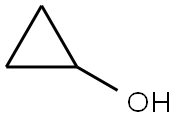Cyclopropanols can be readily synthesized via synthetic transformations such as the Kulinkovich cyclopropanation and the Simmons-Smith reaction [1]. Due to the high strains built intrinsically in the three-membered ring, cyclopropanols and their derivatives are highly reactive and can undergo various ring opening/expansion/fragmentation reactions. A significant amount of these ring opening/expansion/fragmentation reactions are catalyzed/promoted by transition metal complexes. In many of these cases, cyclopropanols and their derivatives are considered as the equivalents of homoenolates or β-alkyl radicals.



